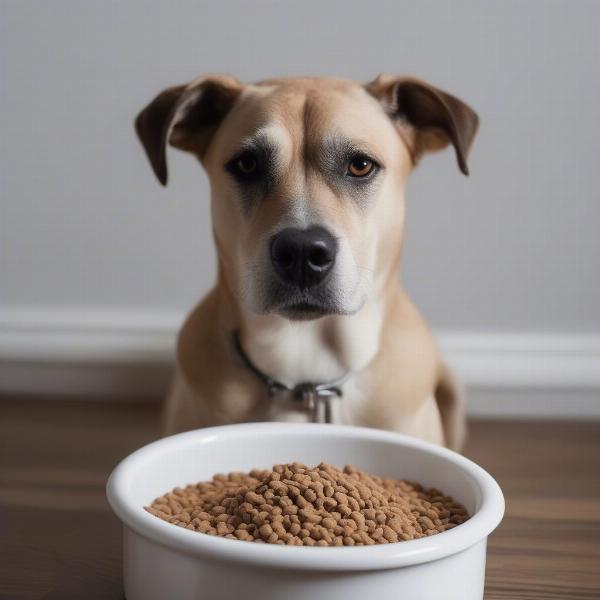It’s a common question among dog owners: can dogs get sick of their food? You carefully select a nutritious kibble, your dog initially gobbles it down with gusto, and then, seemingly overnight, their interest wanes. Are they bored with their food? Have they developed a finicky palate? The answer, like most things related to dog behavior, isn’t a simple yes or no. Let’s explore the reasons why your dog might seem tired of their food and what you can do about it.
Why Your Dog Might Seem Tired of Their Food
There are several reasons why your dog might be turning up their nose at their dinner bowl. While taste fatigue is a real phenomenon, it’s not the only explanation for a sudden disinterest in food.
Taste Fatigue in Dogs
Yes, dogs can experience taste fatigue, just like humans. Eating the same flavor day in and day out can become monotonous, leading to a decrease in appetite. This is especially true for dogs with sensitive palates.
Medical Reasons for Loss of Appetite
Before assuming boredom, it’s crucial to rule out any underlying medical conditions. A loss of appetite can be a symptom of various illnesses, from dental problems and digestive issues to more serious conditions. If your dog’s disinterest in food is accompanied by other symptoms like vomiting, diarrhea, lethargy, or weight loss, consult your veterinarian immediately.
Behavioral Reasons for Picky Eating
Sometimes, picky eating is a learned behavior. If you’ve given in to your dog’s demands for different food in the past, they might be holding out for something tastier. This is particularly common with pampered pooches!
Environmental Factors
Changes in the environment, such as a move to a new home or the introduction of a new pet, can also affect a dog’s appetite. Stress and anxiety can play a significant role in food aversion.
 Dog Tired of Food
Dog Tired of Food
How to Combat Food Boredom in Your Dog
If you suspect your dog is simply bored with their food, there are several strategies you can try:
Rotate Flavors and Textures
Just like we appreciate variety in our diets, so do dogs. Consider offering different flavors of the same brand of kibble or switching between wet and dry food. You can also add toppers like cooked chicken, plain yogurt, or a sprinkle of dog-safe herbs to enhance the flavor and aroma.
Food Puzzles and Enrichment
Food puzzles can make mealtimes more engaging and stimulating for your dog. These toys require your dog to work for their food, which can help alleviate boredom and encourage them to eat.
Mealtime Routine and Consistency
Establish a regular feeding schedule and stick to it. This can help regulate your dog’s appetite and prevent them from becoming picky eaters. Avoid free-feeding, as this can lead to grazing and a decreased interest in scheduled meals.
Gradual Food Transitions
When switching to a new food, do it gradually. Mix a small amount of the new food with the old food and gradually increase the proportion of the new food over several days. This helps prevent digestive upset and allows your dog to adjust to the new taste.
When to Consult Your Veterinarian
If your dog’s loss of appetite persists or is accompanied by other symptoms, it’s essential to consult your veterinarian. They can diagnose any underlying medical conditions and recommend appropriate treatment.
Conclusion
While dogs can get tired of eating the same food every day, it’s crucial to rule out any medical or behavioral reasons for their disinterest. By understanding the potential causes and implementing the strategies outlined above, you can help ensure your furry friend enjoys their meals and receives the necessary nutrients for a healthy and happy life. Remember, a balanced diet and engaging mealtimes are essential for your dog’s overall well-being. Can dogs get sick of their food? Yes, but with a little understanding and effort, you can keep their tails wagging at dinnertime.
FAQ
- How can I tell if my dog is sick or just bored with their food? If your dog is exhibiting other symptoms like vomiting, diarrhea, lethargy, or weight loss, it’s crucial to consult a veterinarian.
- How often should I change my dog’s food flavor? You can rotate flavors every few weeks or months, depending on your dog’s preferences and sensitivity.
- Are food puzzles suitable for all dogs? Yes, food puzzles are available in various levels of difficulty, making them suitable for dogs of all ages and breeds.
- What should I do if my dog refuses to eat a new food? Try mixing a small amount of the new food with the old food and gradually increase the proportion of the new food over several days.
- Can I add human food to my dog’s kibble? Some human foods are safe for dogs, but always consult your veterinarian before adding anything new to your dog’s diet.
- How can I make my dog’s mealtimes more enjoyable? Try incorporating food puzzles, rotating flavors, and establishing a consistent feeding schedule.
- Is it normal for senior dogs to eat less? Senior dogs may experience a decrease in appetite due to various factors, including changes in metabolism and dental issues. Consult your veterinarian to ensure your senior dog is receiving adequate nutrition.
Related Articles
dog friendly hotels ayrshire
dog boarding essex
ILM Dog is your trusted international resource for comprehensive dog care information. From breed selection and health advice to training tips and product recommendations, we’re dedicated to providing expert guidance for dog owners worldwide. We offer expertise in Dog Breeds and Selection, Dog Health and Medical Care, Dog Training and Behaviour, Dog Nutrition and Feeding, Dog Grooming and Hygiene, and Dog Products and Accessories. Contact us today for personalized advice and support. Email: [email protected] Phone: +44 20-3965-8624. ILM Dog is here to help you navigate the exciting journey of dog ownership.